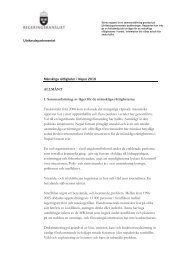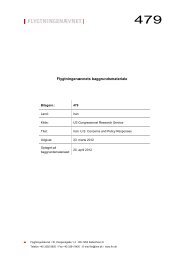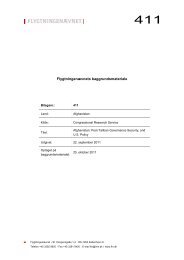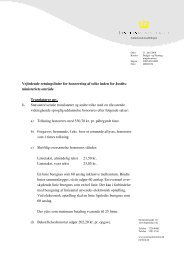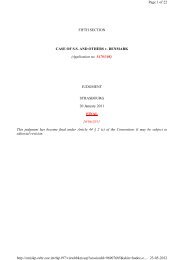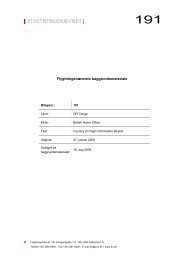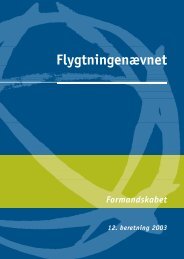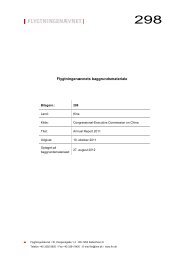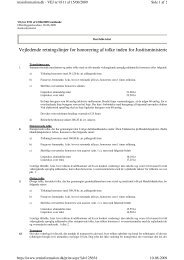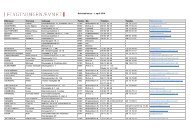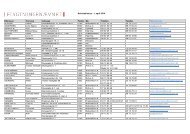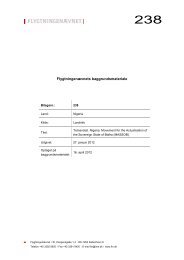Annual Report - National Human Rights Commission
Annual Report - National Human Rights Commission
Annual Report - National Human Rights Commission
Create successful ePaper yourself
Turn your PDF publications into a flip-book with our unique Google optimized e-Paper software.
<strong>Rights</strong> of the Disabled<br />
○ ○ ○ ○ ○ ○ ○ ○ ○ ○ ○ ○ ○ ○ ○ ○ ○ ○ ○ ○ ○ ○ ○ ○ ○ ○ ○ ○ ○ ○ ○ ○ ○ ○ ○ ○ ○ ○ ○ ○ ○ ○ ○ ○ ○ ○ ○ ○ ○ ○ ○ ○ ○ ○ ○ ○ ○ ○ ○ ○ ○ ○<br />
○<br />
having a rights based approach with special emphasis on social, economic and cultural rights.<br />
The enactment of the Persons with Disabilities (Equal Opportunities, Protection of <strong>Rights</strong><br />
and Full Participation) Act, 1995 (referred to as Persons with Disabilities Act) is a signal<br />
achievement of the Indian disability movement. Preamble to this Act clearly delineates its<br />
objective of promoting and ensuring equality and full participation of persons with disabilities.<br />
The Act aims to protect and promote economic and social rights of people with disabilities.<br />
The Act covers seven disabilities.<br />
5.3 Long and persistent discrimination in access by persons with disabilities to education,<br />
housing, adequate necessities of life such as food and health care, work and participation in the<br />
recreation and cultural activities has given birth to an impressive legal and policy framework<br />
which seeks to equalize opportunities for full participation. In concrete terms three enactments<br />
have been brought in force. These also provide mechanisms for planning, monitoring and redressal<br />
of grievances. The enactments include:<br />
●<br />
The Persons with Disabilities (Equal Opportunities, Protection of <strong>Rights</strong> and Full<br />
Participation) Act, 1995<br />
●<br />
<strong>National</strong> Trust for Welfare of Persons with Autism, Cerebral Palsy, Mental Retardation<br />
and Multiple Disabilities Act, 1999<br />
● The Rehabilitation Council of India Act, 1992<br />
These historic legislations are a corner stone of evolution of jurisprudence on the rights of<br />
persons with disabilities in India. As a result, disability concerns have come into<br />
sharp focus.<br />
5.4 There is a lack of systematic data collection and research regarding the efficacy of these<br />
laws, policies, programmes and the institutions established to safeguard the rights of persons<br />
with disabilities. Over last two years the <strong>Commission</strong> has made a number of attempts to monitor<br />
the level of awareness and readiness of various institutions in fulfilling their mandatory<br />
obligations under these enactments. Outcome of these initiatives along with recommendations<br />
for disability inclusive systems and programmes were reflected in Chapter 2 of the annual<br />
report for last year.<br />
5.5 During the period under review the <strong>Commission</strong> introduced a number of proactive initiatives.<br />
These have been beneficial in building the capacity of the key functionaries and institutions of<br />
democracy. Obviously, for effective realization of rights by the disabled, right kind of sensitivity,<br />
skills, and knowledge is required to determine how to apply, when to apply and what kind of<br />
knowledge to apply to eradicate vicissitudes of injustices resulting in exclusion of persons<br />
with disabilities.<br />
84<br />
<strong>National</strong> <strong>Human</strong> <strong>Rights</strong> <strong>Commission</strong> <strong>Annual</strong> <strong>Report</strong> - 2004-2005<br />
AR-Chapter-1-19-10-6-06.p65<br />
104<br />
7/17/06, 6:29 PM



